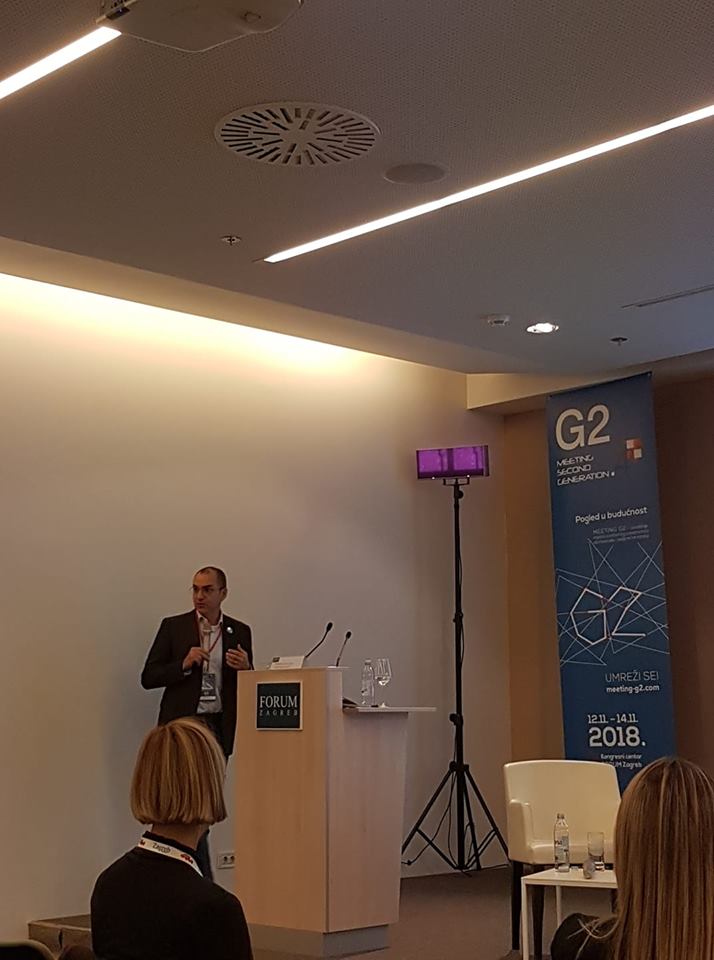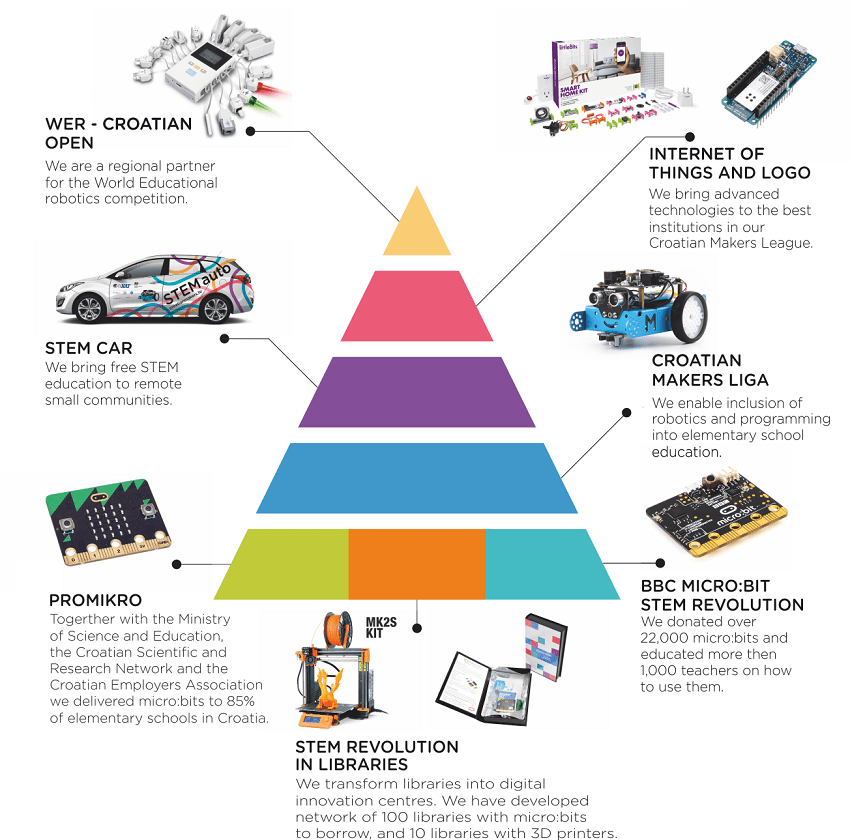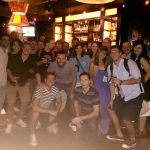November 14, 2018 – The 4th G2 Croatian diaspora conference concluded yesterday at Forum Zagreb, a stimulating 2-day event which brought together the widely dispersed Croatian diaspora from North and South America, Australia and every part of Europe, as well as strong representation from Croatia’s entrepreneurs and start-up businesses.
Among the many excellent presentations, I had been particularly looking forward to successful entrepreneur Nenad Bakic’s presentation on his Croatan Makers project, bringing technology and robotics to the youth of Croatia today. With all the business interests he is running, I have no idea how he finds time to run his STEM revolution, which has distributed 100,000 micro:bit devices into over 1,000 schools, the largest private educational initiative in Croatian history. But then when he sent me a message at 5am this morning, I realised the secret of his phenomenal productivity – the man simply must never sleep. I guess the fact that I immediately responded means that not do I.

I know Nenad reasonably well, and he was kind enough to invite me to the EY Entrepreneur of the Year award earlier this year, where I got a glimpse of a very vibrant and unified entrepreneurial Croatia, which really gave me hope for the future.
I had never heard Nenad give a presentation before, and so I was curious to see how he did. It turned out he did rather well indeed, easily the most engaging presentation of the entire conference, at least in the opinion of this foreign fly on the wall.
He also laid out quite brutally the realities of life in The Beautiful Croatia – how people perceive aspects of life here, using a survey by the European Commission on public opinion about their countries. The survey was published in December 2017, and Nenad wrote about it on his blog earlier this year. I was not the only person who sat shocked in the audience. The data he was presenting was not only shocking, but it also went a long way to explaining why so many people are leaving Croatia today.
The survey asked a number of questions about perceptions of life in the respondent’s EU country, where they were asked to choose from four responses on how much they agreed with a particular questions – Essential, Total Imporant, Total Not Important and Don’t Know. Croatia was at the bottom of almost everything, with the VERY important exceptions of two things – it tells an awful lot about the reality of the daily grind in Croatia (tourists, look away now – it is a GREAT place for a 2-week holiday).
How important is working hard to getting on in life. Croatia, bottom of the EU table of citizens thinking this as essential.
How important is education in getting on in life? Not very (Croatia is joint bottom with France).
How important are political connection to getting on in life? We have an Olympic champion – Croatia, 12 points!
How important is being lucky to getting on in life? The belief in luck is second only to Bulgaria in the EU.
So a country that does not believe in the need to work hard or have a good education, but where political connections and luck are all you need ranks rather differently than most of the rest of the EU, our lucky Bulgarian colleagues aside.
Although Nenad stopped there yesterday evening, I took a closer look at some of the other questions. People here think life is pretty unfair, more so than anywhere but Greece.
Equal opportuities? That is one we could laugh about over a raki or three with the Greeks.
And people certainly don’t get what they deserve in life, if they life in Croatia.
Do political decisions apply to all? Not, apparently, in Croatia.
And a rather surprising finding, for me at least – Croats feel themselves to be the loneliest nation in the EU.
And don’t feel particularly healthy.
With not a lot of happiness.
Nenad Bakic is not a man to dwell on misery and the failings of Croatia. In business and in his educational initiatives, he is working round the clock to bring positive change, and I applaud him for that. The only way to move Croatia forward is through education. Education. Education. Education.
And so, from such shocking findings, he moved his speech to the positive initiatives he and his wife Rujana are working on with their partners. Rather than do a detailed analysis of that work today, here is an English language summary of Croatian Makers and their objectives. You can visit the website here.

IRIM
IRIM (Institute for Youth development and Innovativeness) is a Croatia-based non-profit organization (private foundation), which has developed and implements the largest extracurricular STEM program in EU – the Croatian Makers movement, which now includes over 100,000 children. Although IRIM originates from, and primarily operates in, Croatia, it has recently transposed its activities to Serbia, BiH and Kosovo, where local partners deliver IRIM-designed major projects (with initial funding from IRIM), also with the aim of engaging in joint regional activities. Such cross-border co-operation is of utmost significance in the region which still suffers consequences stemming from the conflicts in the 1990s.
IRIM donates a large amount of equipment (also consisting the main cost of project operations), but only as foundations for wide and deep knowledge distribution using that equipment, through organized activities, teacher education (more than 3,000 teachers educated in Croatia only), content development etc.
The initial and still core financing comes from local philanthropists, family Bakić, but due to developing size and scope of its activities it has lately been attracting additional most of the financing from external sources, including citizens (through public crowdfunding campaigns and general donations), private companies, national and EU development funds. At the moment, IRIM employs 14.
IRIM’s mission
IRIM’s core mission is to empower all the children in Croatia and the region to develop STEM competencies necessary for them to be equal citizens of 21st century, by providing not only equipment, but also education and other activities.
The educational system in Croatia and the neighboring regional is undergoing reforms, but currently it cannot deliver well neither in STEM fields nor in developing key competences such as collaboration, communication and learning skills, creativity, curiosity, persistence and leaderships, and IRIM’s activities are not only naturally inductive for developing those competencies, but also on purpose geared toward them. A nice illustration is this excerpt from a prime-time feature on the national TV about Croatian Makers in Dvor, one of the least developed towns in Croatia:
https://www.youtube.com/watch?v=t67UKkkvGiw&
(turn on subtitles in English).
Additionally, by a relevant research by Eurostat, the citizens of Croatia have the lowest in EU estimate of the importance of education and hard work as key elements for success, and the highest estimate of political connections and luck. It is similar in Western Balkans countries where IRIM’s designed activities are deployed by local partners. Hence, IRIM’s main social mission is creating a culture of success, aiming at strengthening meritocracy as the central pillar and main driver in society.
The central player in educational ecosystem, with strong capacity for co-operation
IRIM strong capacity for partnership and a wide national/public support adds significantly to its success. For example, a project called STEM Revolution was primarily financed by the largest-ever crowdfunding campaign in Croatia, topping over 300,000 USD donated by more than 2,500 individuals and organizations. More than 25,000 coding devices were delivered to more than 1,000 educational institutions including schools, universities, NGOs, orphanages etc., together with extensive teach-the-teacher workshops and developing content.
Following STEM Revolution’s unique success, IRIM partnered with the Ministry of Science and Education to introduce coding to Croatian schools, delivering coding devices micro:bit to all the Grade 6 pupils, developing cross-subject content, and educating over 2,000 teachers. Other significant partners include Croatian Employers Association, Rotary clubs, and a number of corporations like Croatian Telecom, Croatian Post, Tele2, INA – Croatian national oil company, etc., and IRIM has successfully applied to a number of national and EU grants.
IRIM’s unique approach is combining grassroots (movement) with institutionalization. Its strength stems from the base, teachers and children voluntarily joining the movement, but it always strives to institutionalize, getting educational and other institutions on board, thus avoiding friction and using institutional leverage.
Croatian Makers movement by its size and intensity has a great impact not only on schools and other educational institutions and the school system, but the society as a whole. IRIM’s focus in on equality of opportunities and for this purpose IRIM has developed a family of platforms, ranging from most democratic to more complex project like robotics league, advanced robotics competition and other advanced projects. A good example of complex projects is a massive IoT collaborative project which includes 100 schools, engaging in simultaneous measurements of 7 ecological variables and presenting them at a public website in real time. The ability to recruit such a large number of partners for such an advanced project demonstrates the size and depth of the movement and its capacity to devise and manage complex projects.
IRIM’s projects / family of platforms
- STEM revolution / ProMIkro – The most democratic IRIM’s project was introducing coding to Croatian educational system and communities at an unprecedented level using a physical-computing controller micro:bit. Previously, there was no coding in Croatian schools, apart from patchy optional subject.
This project has been implemented in two steps. The first was ‘STEM revolution’, primarily funded by the most successful crowdfunding campaign ever in Croatia. It brought 25,000 coding devices to more than 1,000 institutions in Croatia (elementary and secondary school, universities, libraries, orphanages …) together with developing curriculum and teaching the teachers. For the second, ProMIkro, IRIM teamed up with the Ministry of Science and Education which funded 45,000 micro:bits for all the Grade 6 children in Croatian schools, thus effectively introducing coding to elementary schools. The schools opted in voluntarily, and 85% of them opted to join the project. Thus coding was thus effectively introduced to Croatian elementary schools.
Teaching the teachers was the key element of the projects. Following a large-scale education effort in STEM Revolution, in ProMikro IRIM delivered more than 500 workshops in 3 waves for 2,000 teachers, out of whom the majority never, or rarely, coded before. The workshops were executed by a network of 30 technology ambassadors IRIM developed from its ecosystem, and workshops were financed by the Croatian Employers’ Association. IRIM developed extensive cross-subject curriculum comprising of more than 60 teaching lessons ready to be taught in class.
- Croatian Makers Robotics League is IRIM’s flagship project in robotics, the largest competition of such kind in EU with more than 11,000 children included in more than 550 schools and non-profits, whereas IRIM has donated more 2,750 robots. The educational institutions participate regularly, in 4-5 rounds during the schools year, and locally, so that the subject can be integrated into the curriculum, and not be (as is usual with robotics competition) one-off.
The successful concept of the Robotics League has since been successfully implemented in Serbia, BiH and Kosovo by local partners (with IRIM’s initial donations), and the one in Serbia now includes almost 500 schools, and has been mostly financed by Serbian government.
It important to emphasize that the Robotic League is using the same robotics platform (mBot by Makeblock) in all included countries, which ensures full compatibility and interoperability of activities at regional level.
- Advanced regional robotic competition WER using advanced robotics sets by Abilix, participants being all the best regional teams from abovementioned leagues is regional flagship competition in educational robotics. IRIM is in talks with another global leader in educational technology, Makeblock, to implement Makeblock regional / EU competition, and its ‘league’ concept to be implemented globally.
- STEM car, a ‘modern era-moving library’, bringing free coding and robotics classes to less developed communities. STEM car is a continues project (in 2018. there will be 6 cross-country tours lasting 2-4 weeks) and has already visited hundreds of villages and towns, with hundreds of workshops for thousands of kids, introducing them to the world of technology and inducing them into other IRIM’s activities.
- Izradi! IRIM uses several channels of knowledge distribution, among which is a premier one is its content platform Izradi! (=Make!).
- STEM Revolution continues – Libraries – Especially worth noticing, whereas IRIM aims to empower public libraries to become centers for developing digital competencies in local communities. It is equivalent to e.g. Singapore’s national Digital Maker program aiming to transform the nation introducing technology to schools and families (using primarily micro:bit, as IRIM does). Within the project, IRIM donated
- coding devices micro:bits for free workshops and to borrow to 100 public libraries in Croatia
- donating 3D printers to 10 and to the National and University Library.
Thus, libraries are transformed into public learning spaces for new technologies, but also as digital innovation centers.
- Advanced IoT in Croatian schools Technologically most advanced project by now for the whole Croatian Makers ecosystem has been, financed primarily by Croatian Telecom, which has been the largest outside donor, IRIM winning 2 of its major grants.
Using advanced Arduino technology, 100 educational institutions – schools, NGOs, orphanages – simultaneously measured and publicly displayed 7 ecological variables, including micro-particles. That final demonstration was preceded by two calls for creative projects in using IoT related to smart homes and pets and domestic animals.








